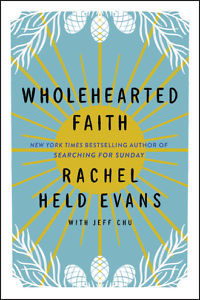A Faith Observed
A posthumous collection of essays explores Rachel Held Evans’ spiritual vision

In a posthumous collection of essays, bestselling author and self-described “religious overachiever” Rachel Held Evans describes a way of pursuing God that embraces uncertainty, vulnerability, and compassion. Evans’ friend, author Jeff Chu, has revised her unfinished manuscript and compiled other unpublished essays to create Wholehearted Faith, the final book from this beloved writer and activist who died of influenza-related complications at age 37 in 2019.
Evans — who grew up in Dayton, Tennessee, site of the infamous 1925 Scopes Trial — championed other Christians wrestling with the line between orthodoxy and heresy and spoke her truth within a movement of post-evangelicalism. She was able to capture the attention of evangelicals and progressives because of her ability to bridge the rhetorical divide between them. In her previous books, including Evolving in Monkey Town, A Year of Biblical Womanhood, and Inspired, she traced her evolution from fundamentalist to feminist. In Wholehearted Faith, she explores a theology that is unafraid to reach across differences of race, religion, and science.

Evans called herself a “memoirist,” although it’s hard not to mourn the loss of the preacher she could have been if raised in a tradition that ordained women. In these essays, she delivers biographical details with discernment, choosing instead to discuss theological ideas over personal events. She recounts familiar anecdotes with her signature humor: her childhood wish to be rewarded with “The Best Christian Attitude,” her adolescence as a “Jesus freak,” her obsession with strong women in the Bible, and her addiction to winning Twitter arguments against conservative men. The Christian beliefs she addresses are framed by evangelical paradigms about the centrality of the Bible and the necessity for believers’ testimony of their personal relationship with Jesus. The re-engagement of these apologetics can at times limit the expansive spiritual view she pushes toward. However, the voices she pulls in to reframe her faith are revolutionary in the context of these Christian conservative doctrines and practices.
To broaden her understanding of God’s grace, she consults Black Liberation and Womanist theologies, Jewish midrash, and the social science research of Brené Brown and Jonathan Haidt. It is from Brown’s concept of wholehearted living that Evans coins her concept of wholehearted faith, which she describes as follows:
To live and love fully, to embrace human vulnerability rather than exploit it, to try and make sense of our place in this fragile yet beautiful world, to seek to understand our role proclaiming God’s love and justice – this has been the work of generations.
She then explores all the ways religions have taught people to disintegrate, disengage, and numb themselves as they try to conform to gender roles, deny desires and talents, stifle questions, and silence their consciences in the face of systemic oppression. She encourages her readers to see that true faith embraces uncertainty and vulnerability rather than conformity and silence.
 Self-awareness is a strength in her work and perhaps especially so when she turns her discerning eye to her own motivations and methods as a writer. She admits that although her theology might have progressed, the patterns of fundamentalism are firmly ensconced in her psyche. She wonders if she is “trying to construct a façade of certainty” with her arguments no matter which side of the divide she occupies. “At times it is as if I didn’t dismantle that fortress at all. I just took one flag down and raised a different one in its place.”
Self-awareness is a strength in her work and perhaps especially so when she turns her discerning eye to her own motivations and methods as a writer. She admits that although her theology might have progressed, the patterns of fundamentalism are firmly ensconced in her psyche. She wonders if she is “trying to construct a façade of certainty” with her arguments no matter which side of the divide she occupies. “At times it is as if I didn’t dismantle that fortress at all. I just took one flag down and raised a different one in its place.”
Perhaps the most poignant story of her fragility is not the one Evans narrates in this book, but the one her editor and her readers know is unfolding for her — the approaching inevitability of death. After an amusing and self-deprecating story of all the ways her misguided ambition scored her Jesus points, a light-hearted lesson turns to poignant prophecy:
If you want to follow me, you have to prepare not to win but to lose, Jesus says. You might have to lose your need to be right, your lust for blue ribbons, your desire to be first. You — as well as all your claims to the Best Christian Attitude Award — might even have to die.
Although these pages call us to embrace the precarious nature of our existence to enliven our faith and compassion, Rachel’s sudden death did not allow for her to reflect on her own brush with mortality. We may never know the true revelation of a wholehearted faith forged in vulnerability by this prophetic writer, but we are left with a lovely testimony of the faith described in the New Testament as “the substance of things hoped for and the evidence of things not seen.”
Beth Waltemath, a native of Nashville, is a writer, writing coach, and a minister. She currently lives in Decatur, Georgia. Her essays have appeared in The New York Times, The Washington Post, and Chapter 16.


